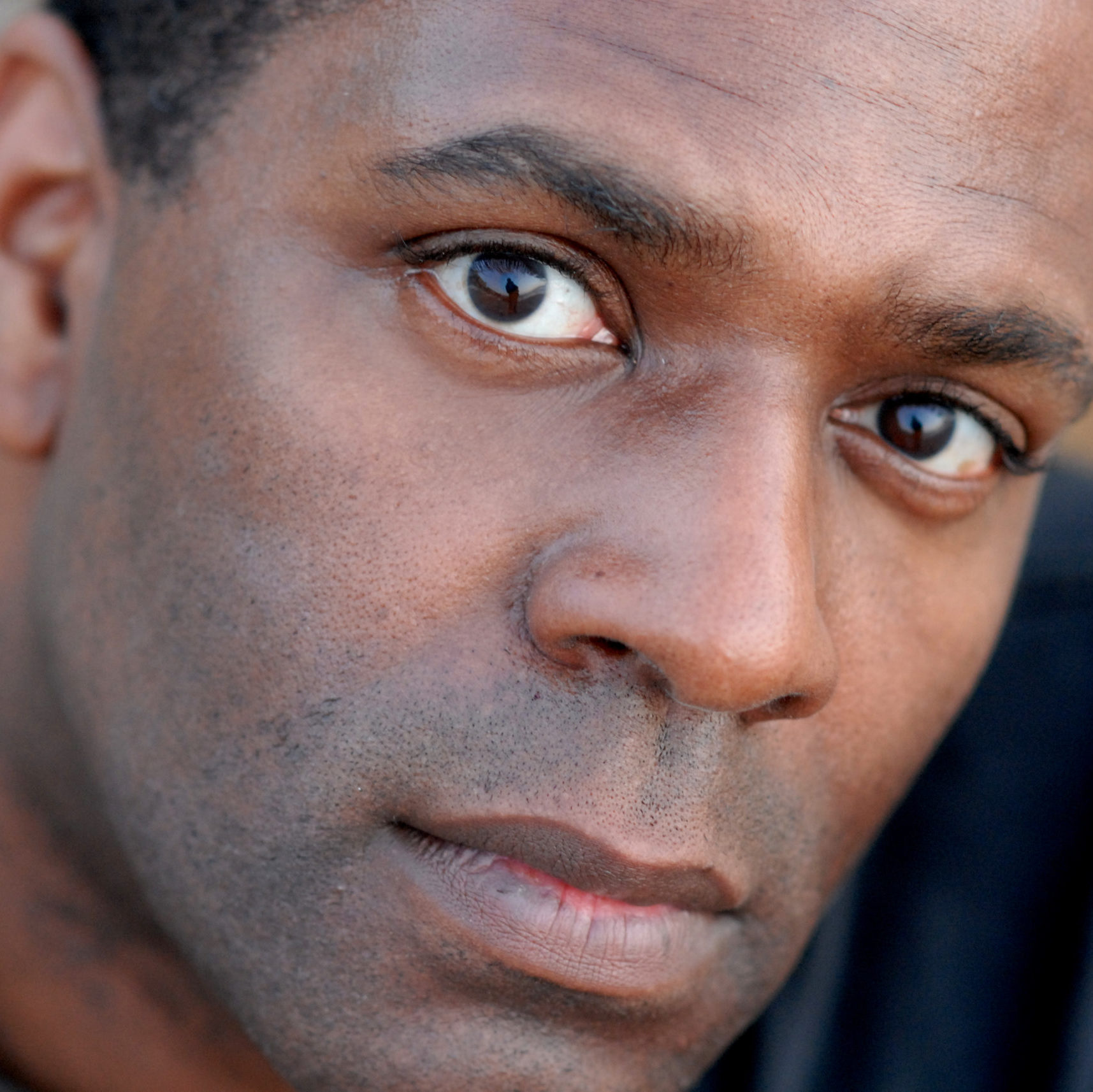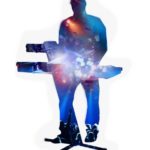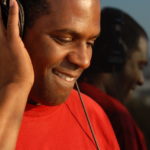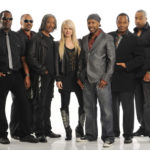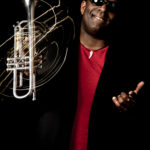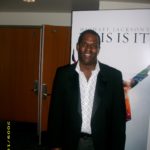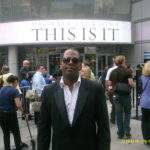The rehearsals for This Is It will remain the last moments of the King of Pop performing on stage. I have rarely raised the subject, but my conversations with Morris Pleasure, a keyboardist and member of the band on that tour project, gave me the desire to approach it on my website. It was also an opportunity to go back over the career of Morris who also played with Janet Jackson, Ray Charles, Earth, Wind & Fire and so many others. I would also like to take this opportunity to say hello to my friend Marc Storey whom I was able to hand a copy of my book to, during my last trip to London, so that he would give it to Morris.
First of all, can you tell us how you started a passion for music, playing several instruments and making a career out of it?
I was 4 years old when I started classical piano. My parents were teachers and educators, and they saw some kind of talent. I started at my church where they had lessons for free. So I played piano and then I went to violin – I played piano for my dad who was a very good singer and I ended up being his accompanist. As I got older, I was involved in everything: orchestras and Jazz bands, playing for choirs and everything like that. When I grew up, I was not allowed to listen to pop music so much – I would listen to classical music because my parents had ambitions for me to be a concert pianist or a conductor. They didn’t do Soul music or Jazz so much. My dad would play Nat King Cole and he liked it, but I think, because once again they were educators (my dad was a school principal and my mother is a teacher) and very strict, they were not really trying to see me playing Pop music or Soul or that kind of things…
In 1976, I saw a concert of Earth, Wind & Fire when I was 14, and that was the defining moment for me because at that instant I knew I wanted to play that kind of music! So that’s when I started playing the bass. I had already been playing trumpet as well since I was 12 years old. At this point, I had been playing piano, trumpet, violin, and I had even taken drum lessons, and now the bass which is still my love! Then from there, in Middle School and High School, I had my own bands so we would do Earth, Wind & Fire and all the 70s bands that had a horn section. You know, I grew up in a completely white town in Connecticut where there were maybe four black families in the whole town. We were one of them and my dad was the principal of one of the schools. My mom and dad were from Louisiana, from the New Orleans area. So every year we would go and visit my grandparents, and I would go to their Baptist church. I would hear that Gospel sound and it stirred something inside of me… so I knew there was a connection to my soul in that music. That helped me think out what kind of a musical direction I headed in – it was Soul music!
How did you start as a professional musician? What were the key moments on the way?
Well, I went to college at the University of Connecticut, initially for Electrical Engineering, but I was still a professional during that time because I was playing bands at night: Rock’n’roll bands and Country bands, and Jazz… While I was in college, I went to a Ray Charles’s concert for our Homecoming weekend, and after the concert I went backstage just to maybe get an autograph or whatever… The music director for Ray Charles, Clifford Solomon, was looking to get a beer to drink, so I took him to the local pub and we had a drink. I asked him, “How do I get into this kind of business? How do I get into being a touring musician?” He asked me which instruments I played so I said, “Piano and bass.” He told me that the bass player was about to leave and they were looking for a new bass player for the next tour. He gave me an address where to send a demo tape, so I put this tape together that I sent out there. Several months later, they called me! It was a big surprise because, being in college, I was not in a music major to start – I was in electrical engineering. My parents thought that I would never be able to make money in music, so they wanted me to have a more secure job. So Ray Charles called me himself – I was in my college dorm (laughs) – and it’s a long story from there to me actually doing a full tour with Ray. The short version is I went on to audition and I did not tour with him that year, but two years later I got the call again and I went out for a full tour with Ray Charles in 1986. I got to see the world – I went to France and England, Brazil and Japan, so very early in my life since I was around 23-24 years old. It was a good learning experience because Ray Charles was a tough boss, very hard on musicians, but I learned a lot!…
One of the crucial points in your career was joining the band Earth, Wind & Fire. What was your part and type of collaboration in this group ?
In 1993, George Duke recommended me, not for Earth, Wind & Fire at first, but to write for Philip Bailey for a solo album that he was doing. When Philip came to my house, I was obviously starstruck. I gave him a cassette of some of my demos and he gave it to Maurice White. It just turned out to be perfect timing that they reformed Earth, Wind & Fire that same year. Philip remembered me, so he called me and asked me to join the band. The following year, Maurice White decided not to tour with Earth, Wind & Fire and the band had to take a chance going on the road without him. It was that year, 1994, that Philip gave me the job of Musical Director which I kept until 2001. I came in as a keyboardist to Earth, Wind & Fire. As Musical Director, I was in charge of putting the show together with Philip before we started rehearsal because we had a number of songs to come up with new arrangements etc. to. At this point, the band had been doing them for more than 20 years, so they always wanted something new. Philip and I were discussing the song “Getaway” and were like, “So what do we do here?” And he said, “Double-bass solo! You and Verdine!” That was kind of crazy because, when I was a kid, I used to dream about being in Earth, Wind & Fire, but I was always the bass player like “Bring me in, please! I know all the songs!” (laughs) So here I am, in reality, doing a duet bass thing with one of my bass heroes from when I was 14 years old. It was surreal!
How did you feel about Michael Jackson and his music before you started working with him?
Well, I have been a fan of Michael Jackson since I was 8 years old, and we’re almost the same age. They had TV shows, a cartoon on Saturday mornings… so I was a huge Michael Jackson fan. I never dreamed that I would ever get to work with him and as you remember, he didn’t do any touring for almost 10 years, so even when I heard about the This Is It tour coming up, I never thought that I would get an audition.
How did you join the band on the This Is It project as a keyboard player?
Actually by the time I heard about it, they already had the band together. My wife Lori was the one that told me about it because musicians’s wives talk to each other, so sometimes they have a bit of information and a close friend’s wife said, “Hey, guess what? I heard that Michael Jackson is going out!” Lori said, “Why don’t you get in touch with Michael Bearden and Michael McKnight?” because she knew they would both be part of the gig. But I was like, “No, no, we’ll just let it happen. If it happens, it happens.” I have never been anybody to sollicit myself. Every gig of my career came to me from somebody hearing about me and my abilities. My friend and keyboardist Michael McKnight also told me that I should get in touch with Michael Bearden who was the music director. I’ve known Michael Bearden since the late 1980s, so I sent him a note saying to please keep me in mind if he needed somebody in the 2nd keyboardist slot. He wrote me back that they had someone already but to keep in touch. Then, the other keyboard player ultimately became unable to do the This Is It Tour, so three weeks later I got a call back saying, “Can you come out and do the gig?” When I appeared I was three weeks behind, so I had to learn all the songs but it wasn’t that hard because I knew most of the Michael Jackson songs, and in a matter of a week I was already caught up.
What was your first meeting with Michael Jackson like? Did you talk on that first meeting and what about?
There was not much communication with Michael – my first meeting with him actually was a fist bump!.Somebody made a joke about us doing the fist bump, and he and I just looked at each other and kind of laughed, and that was it! That was my first interaction. Other than that, it was all rehearsals. I think in the movie they showed when he talked to all of us, gave us a pep talk and shook all of our hands and said “Thank you!” – that’s the only other real personal interaction I had. Only through the music and rehearsals. I really liked him very much and I sensed that if we had had a chance to go out and actually work together, I would have gotten to know him a little more – I have that feeling that we would probably get along…
With Michael Bearden, you were both new collaborative partners for Michael Jackson on stage after a long break on his part. Did you have to work many sessions with him to nail the right keyboards programs and sounds?
Well, at that time a lot of that was done because we had programmers and everybody in the band was amazing: Sugarfoot, Orianthi, Judith… By that time we were a family and everybody knew their place and what their job was, so it was very quick. All the sounds for my keyboards were in my splits because I had four keyboards and each one of them could be a variety sounds, like one keyboard could have four pad sounds on it including explosions. We would be doing all the sound effects on keyboards. There was no other way to do them – we just had to watch Michael and if he made a move, that was our cue. Plus we had to kind of reading his mind and he used to test us a little bit because he would do it differently every time! (laughs) He was a great guy and he had a great sense of humor – we used to laugh a lot!
Regarding the programs and the sounds, it was the opportunity to work with a technician like Michael Prince.
Michael Prince was there of course – he knew Michael Jackson very well and they worked on projects a lot. I’ve worked with Michael Prince since then – he’s a consummate professional great guy, and I’m glad he’s had the chance to carry on Michael’s legacy. When we did This Is It, they had guards to keep all of those Michael Jackson’s recordings from rehearsal. Even for the film This Is It, at the Sony premiere, we were not searched but we were definitely watched as we walked out just to make sure that nobody videotaped it.
No brass instruments had been played on a Michael Jackson tour since the Triumph Tour with his brothers in 1981. How did the idea of you playing the trumpet emerge, and on which songs was this planned?
Well, I brought that up that myself. I would go to the studio with master programmer David Polich and I would play all different notes and different articulations (shakes, falls etc.) that we could program in my keyboards and add to the internal keyboard sounds. On This Is It, you can see the meeting where Michael said, “Don’t hold back!” So I just decided, “Well, let me bring my trumpet out and see if I can use it in a few places.” I would actually play the horn line and the trumpet on a few jams, and I was just getting started with it to be honest when Michael died… I was always looking for something in performing that would raise attention and having the trumpet was cool to me because I coud be a little bit more seen. The song “Jam” was the one I remember the most. (Sings the horn line played on keyboard in the studio version.) It was something I could do with the keyboard and play at the same time with the trumpet.
Any special story you might agree to tell us about the rehearsals, please?
The first time we did “Billie Jean” was pretty memorable. It’s actually in the movie, but we have to remember this is a solo piece by Michael. The whole time in the rehearsals we would play to no-one in the audience. The point about This Is It is that sometimes people forget that the amount of energy that we were putting out was probably 80% of what it would be on the show. So this particular rehearsal was the first time we got to see Michael do “Billie Jean” with the sound effect as he was walking to his briefcase, getting his glove out before we got into it. The other thing is that I had to remember to play an explosion on the last note of the song! (laughs) We get to the end of our first rehearsal of “Billie Jean” with MJ where it’s drums and then Michael free-styling. MJ was 10-15 feet away from me like I could almost touch him, so I had to be careful not to get caught up in the show as if I am an audience member because I would forget since it was so amazing to watch 50-year-old Michael trying out his moves again for the first time in a long time. All the dancers were just going crazy because he moved like he was 20 years old, you know. So I was watching as a fan but then I thought, “I’d better not forget that explosion at the end or I’ll get fired!”
You also played keyboard on Janet Jackson’s All For You Tour in 2001/2002. Any similarities and differences you might have spotted between Janet and Michael regarding how they interacted with the band and got ready for their shows?
Yes, there were differences but also there was a lot of similarities. You know, in every gig that I did – Christina Aguilera, David Foster, Maxwell – there were certain things that were very corporate about certain gigs. Basically you have to show up and do your job, don’t ask questions and make sure the artist is comfortable… Everything that you’re doing is about getting your job done. It’s not like you’re going to be going up there and get Michael and say, “Hey, how you doing ? Everything alright?” It’s never that kind of relationship at rehearsals. Still, Janet was really friends with the dancers. Sometimes musicians and dancers were kind of separate and the artist travels with the dancers, or musicians travel together with the orchestra, that kind of things. There were lots of things that you could see Janet got from Michael, not just in term of her style but also command of the whole stage with just a movement of her finger sometimes. Other than that, they were both very nice people.
Many people think that Michael Jackson was very nervous and stressed out about those shows in London. Did you feel the same way at the time?
We were very confident. In front of us was a sign that said “11 days to go!… 10 days to go!…” I think “9 days…” was the last one we saw because we had a few rehearsals scheduled to do at the O2. Actually, the day that Michael died, I remember they said he would come a little bit later than he was supposed to, and normally when you get that kind of time, you’re tweeking, trying to fix the sound and make sure that the guitar is right… But I remember I was sitting on a tour case outside of one of the offices next to Sugarfoot Moffett and he said to me, “I’m worried about Michael.” I said, “Really? You’re kidding!” I had no idea what he meant but he’s known Michael for 30 years. He said, “We have to come together as a band. He needs us right now. I can tell something’s wrong. I gave him a hug and my arms were all the way around him and he’s not eating the way he should… Something’s wrong…” So I said, “Ok, man, sure! I’m down, anything you need, you can count on me, I’m there!” And next day, Michael died…
How were you told that Michael had sadly passed away only 3 weeks before going on stage with him?
When I heard the news, I still had to go to the rehearsal that day, so I was thinking to myself, “Well, this is Michael Jackson and the news says he died but I’m not going to believe it until I get there because it might be something just some kind of rumor and maybe he’s moving the whole band to Bora Bora or something.” When I pulled up to the StapIes Center, I could see the police and tape everywhere, and that’s when I knew it was real… So I parked my car and when I walked in – we had to sign in to go into the Staples Center – Sugarfoot was there and signing in, but his whole body looked like it was… I can’t explain it…it was like he had lost his spirit… I went to him and he said to me, “Remember what I said yesterday?…” Pretty tough… And then of course, we had to play his Memorial which was really really hard, and on the same stage as we had been rehearsing… It was a horrible feeling…
Do you sometimes watch the movie This Is It? Do you mostly feel sadness or pride?
I’ve seen it maybe 3 or 4 times – two of them were screenings in L.A. We had a private screening at Sony and then we had a red carpet screening at the Nokia Theater. Since then I might have seen it twice – I went with some friends once – or maybe three times… I haven’t seen it in years now but I’m glad it’s out there…. I just don’t watch it… It’s a weird thing because I thought I would never have the chance to work wih Michael Jackson, but at the same time we never went on tour… It’s a blessing, of course, and in reality now, I gain a lot of exposure from having worked with Michael and because of the movie. We didn’t know there was going to be a movie made from the rehearsal video – we were being filmed to make dailies for Michael so he could watch the show and make adjustments.
As a conclusion, can you tell us where you put those months of rehearsals in your career?
Well, back in 2009 I started doing a musical project, a tribute to Michael Jackson that I have not released yet, but I have about 20 songs. I will release it but my reasons for not releasing it yet are that it started out as a quest to really give admiration and respect to the music. Because Michael was so talented that a lot of times it was always about his incredible dancing. Of course, the music speaks for itself with Quincy Jones, Greg Phillinganes, John Robinson, Bruce Swedien… They are all friends of mine now, so I know all kinds of stories about the actual production of the music. But I wanted to do a musical tribute in a way that was different so I took each song and did them in different styles. For instance, I’d take “Another Part of Me” and do it in the style of Miles Davis’s “So What”. It also includes a solo guitar version of “Human Nature”, for example. Many musicians were getting involved all over the world and people started to say, “Guess what? I wrote a song for Michael!” People would come to me with Country songs, R & B songs on and on. I started getting songs from everywhere – it was incredible! So I had to get permissions to use them and all that kind of stuff… On some of the songs, I have string sessions and pieces but it’s just that I haven’t really figured out first of all the best way to put it out, and I really want the Jackson family’s blessing although that’s a really really tough thing to get!… Even though I’ve played with Tito, Janet, Michael, Marlon, all of the Jacksons… I’m probably going to have to put it out independently and I’ve even been thinking about creating a website or an all MJ Tribute channel on Youtube – where others can contribute and I can release material.
